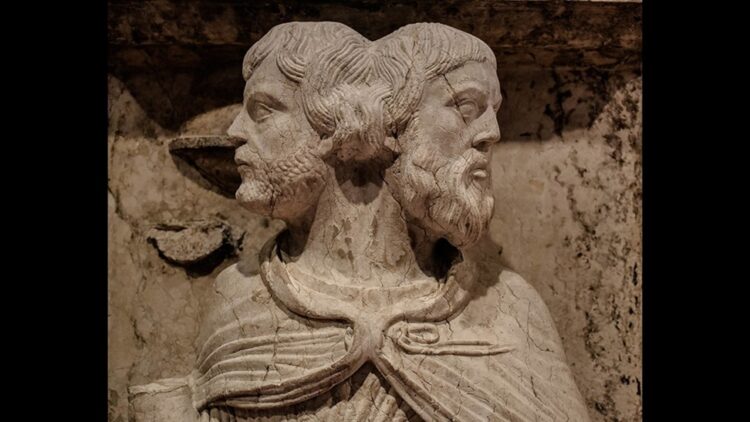Persona
Assume a work identity, conform
And hide behind an urban harlequin,
Conceal the tattoo beneath a uniform,
Desert yourself and cloak the genuine.
The Greeks devised a rich formality,
Dramatic masks of frozen mirth and gloom.
A shaman’s rites in anonymity
Demand an alien spiritual costume.
Conceive of cyberspace as open doorways
Between the real and virtual creations.
See one as playing a role—tentative forays
Of the mind, avoiding real perceptions,
Leaving a self that may be odious
To seek another restless self—as Janus.
Norman L. Hills is a retired software engineer living in Iowa.
















Norman, I like your rhymes, particularly the ending with “odious” and “Janus.” Your subject and message are well thought out and considered. I may be the least one to comment on meters and counts, but this sonnet for me could have been a perfect 10 count. I have some suggestions. I do not know how you take criticism, but if you want to delete my comments, you may request the Moderator delete mine in response.
1. Line 2: I would replace the comma with a period. I also would have period after uniform in line 3.
2. Line 3: (Extra count) I would delete “the” before tattoo and add an “s” to tattoos.
3. Line 8: (Two counts) I would delete “ual” from spirit”ual” and leave just “spirit.”
4. Line 9: (Extra count) I would delete “of” and reverse the first two words to “Conceive cyberspace.”
5. Line 10: (Extra count) I would delete “the” after “Between.”
6. Line 11: (Two extra counts) a.) I would delete “as” after See one… b.) Change “tentative” to a two-syllable count synonym like “iffy.”
7. Line 14: (Extra count) This could be accomplished by replacing “another” with something like “one’s own.”
Thanks for taking the time to read this carefully. Your comments are appreciated.
Norman
Norman, I very much like the concept of your sonnet, moving from classical masks to the rough equivalent in cyberreality. You even remind us here, making online comments, that we could be restless role-players running from reality. Hoping to focus instead on your words, the octave/sestet contrast is handled well, with a very noticeable sonnet turn exactly in the traditional place. The concluding couplet is sharp as it should be.
With Roy Peterson above, I’ll say some lines are rough, but when I can find five stresses in a pentameter line, I’m satisfied with substitutions for iambs. Lines 3 and 8, with roughnesses, are acceptable as is, but lines 11-12 appear to crash. When you have two lines with very problematic meter in a row, it’s time to think of re-working them. The couplet does recover the sonnet, though! As Roy remarks, you can have the moderator delete criticisms if you like, and for that purpose, I’ve made this a separate paragraph for possible elimination.
Thanks for taking the time to read this carefully. Your comments are appreciated.
Norman
Lines 11 and 12 do need heavy revision. I would suggest the following, as a way to tighten them up:
Just play a role– make tentative forays
Through mind and thought, plain facts, hallucinations,
That would clear up the meter, as well as being more direct and vivid. It also gives you the rhyme you need with “creations”.
Thank you for commenting.
Norman
Hi Norman,
Just getting attention from these three poets is a “hat tip” to
your poetic abilities. I have learned much from reading their
expositions of poems on this site. I think your poem creative
in its expression of unusually stated insight into the human
condition. It certainly seems you are writing about “what you know.”
Perfect graphic from Evan too.
I really enjoy the way meter is slightly disregarded at points, like the old poets had purposely done — “meaning over a sounding line.” You get your point across beautifully here. We certainly live in a world that rewards lies. Thank you for sharing this.